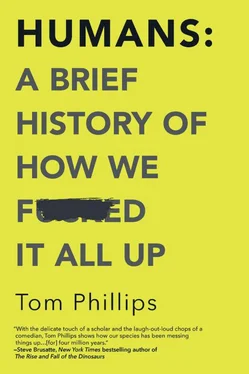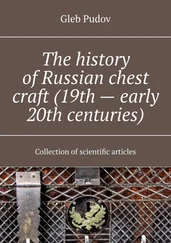Tom Phillips - Humans - A Brief History of How We F*cked It All Up
Здесь есть возможность читать онлайн «Tom Phillips - Humans - A Brief History of How We F*cked It All Up» весь текст электронной книги совершенно бесплатно (целиком полную версию без сокращений). В некоторых случаях можно слушать аудио, скачать через торрент в формате fb2 и присутствует краткое содержание. Город: Toronto, Год выпуска: 2019, ISBN: 2019, Издательство: Hanover Square Press, Жанр: История, Юмористические книги, на английском языке. Описание произведения, (предисловие) а так же отзывы посетителей доступны на портале библиотеки ЛибКат.
- Название:Humans: A Brief History of How We F*cked It All Up
- Автор:
- Издательство:Hanover Square Press
- Жанр:
- Год:2019
- Город:Toronto
- ISBN:978-1-48805-113-5
- Рейтинг книги:4 / 5. Голосов: 1
-
Избранное:Добавить в избранное
- Отзывы:
-
Ваша оценка:
- 80
- 1
- 2
- 3
- 4
- 5
Humans: A Brief History of How We F*cked It All Up: краткое содержание, описание и аннотация
Предлагаем к чтению аннотацию, описание, краткое содержание или предисловие (зависит от того, что написал сам автор книги «Humans: A Brief History of How We F*cked It All Up»). Если вы не нашли необходимую информацию о книге — напишите в комментариях, мы постараемся отыскать её.
Humans: A Brief History of How We F*cked It All Up — читать онлайн бесплатно полную книгу (весь текст) целиком
Ниже представлен текст книги, разбитый по страницам. Система сохранения места последней прочитанной страницы, позволяет с удобством читать онлайн бесплатно книгу «Humans: A Brief History of How We F*cked It All Up», без необходимости каждый раз заново искать на чём Вы остановились. Поставьте закладку, и сможете в любой момент перейти на страницу, на которой закончили чтение.
Интервал:
Закладка:
In case you’re wondering about that “future research,” for the next four decades, almost all of it was either funded by the companies who made leaded gasoline, or carried out by their own staff. In shock news, this research was inconclusive! Which was all the producers of TEL needed to make the case that the question was still undecided, and it would be very, very bad and wrong to stop selling this lovely fuel that had enabled so many dreams to come true.
Because once leaded gasoline had been given the supposed all clear, the sky was the limit. Not only did it stop car engines knocking, it enabled the development of a whole new generation of more powerful engines, which turned cars from practical but ungainly old bangers into fast, smooth, sleek objects of desire. An aggressive advertising campaign played on fears of having a slow, crappy car if you didn’t use leaded fuel; rival products from competitors, including those that used ethanol—the very substance Midgley’s team had advocated for years—were derided as substandard. When health fears were raised in other countries about the introduction of leaded fuel there, the fact that the Americans had said it was A-OK was used to tamp down those fears; the Surgeon General, Hugh Cumming, even communicated with his counterparts overseas to tell them how extremely safe it was.
Backed by some woefully bad science, a rapacious desire to make money and the fact that powerful cars are cool and let you travel farther, leaded fuel quickly became the standard around the world. Thanks to advances in the oil extraction game, the supposed fuel shortages that had prompted the work on antiknock agents in the first place never materialized, so instead all the benefits from lead went toward making ever more powerful engines. The age of the automobile was here, and across the globe, more and more people started breathing in lead fumes.
The thing about lead is that it doesn’t break down. While some toxins will become less dangerous with time, lead builds up—in the air, in the soil and in the bodies of plants and animals and humans. In 1983, a report by the UK Royal Commission on Environmental Pollution concluded that “it is doubtful whether any part of the earth’s surface or any form of life remains uncontaminated by anthropogenic lead.” Children’s bodies are especially at risk, as they absorb five times the amount of lead into their systems as adults. In the US alone, it’s estimated that 70 million children had toxic levels of lead in their blood in the decades between the 1920s and 1970s.
The effects of lead are severe. The World Health Organization estimates that hundreds of thousands of people die annually worldwide from lead-poisoning illnesses, such as heart disease. Beyond the physical health effects, lead also damages children’s neurological development—it causes a drop in IQ levels among affected populations, and is estimated to be the cause of over 12 percent of developmental intellectual disabilities around the world.
It also causes behavioral problems, such as antisocial behavior, which gives rise to one of the more nightmarish possible consequences of Thomas Midgley Jr.’s work. It’s important to point out that this is, to date, just an unproven hypothesis, but a number of researchers have pointed out that the enormous spike in crime levels that occurred across much of the world in the postwar period tracks pretty neatly the growth in lead pollution.
The crime levels that gave rise to many of our casual cultural assumptions—the feral teens and the inner-city hellscapes and all that nineties talk of “superpredators”—are in fact a historical anomaly, a global blip that is hard to explain and now seems (hopefully) in the past. But in country after country, regardless of their social conditions or political direction, crime started to spike a couple of decades after leaded gasoline was introduced there—in other words, when the first children to be exposed to it in significant amounts reached their teens and early twenties. And the correlation applies in the opposite direction, too: the past few decades have seen a consistent fall in violent crime around much of the world, again regardless of what social policies each country might be implementing. But the drop in crime does seem to occur around two decades after each particular area banned lead in gasoline—happening sooner in the places that banned lead earlier, and more rapidly in the places that stopped its use abruptly rather than gradually phasing it out.
To reiterate, correlation is definitely not causation, and this is still no more than informed speculation. Given the ethical issues you’d hit if you tried to inject a load of children with lead and then wait around to see how many crimes they committed twenty years later, it may never be proven one way or the other. But in addition to possibly millions dead, and the fact that we’ve polluted every corner of the planet, and the knowledge that multiple generations of children had poison in their blood that affected their intelligence (those are the generations, by the way, who have BEEN IN CHARGE OF THE WORLD FOR THE LAST FORTY YEARS), the possibility that we might have caused a global crime wave that lasted for decades and entirely reshaped our view of society, simply because Thomas Midgley wanted to make three cents on the gallon, is… well, it’s a very long and very dark joke.
Midgley himself did not hang around after inventing leaded gasoline. Ever the tinkerer, he quickly moved on to other areas of investigation—and he still had his second catastrophic mistake to make.
Unlike the years-long search for a better fuel, this one came quickly. In fact, according to corporate legend, it took Midgley all of three days after being set the problem before he found a solution. And unlike lead, this one genuinely is a case of unintended consequences: there were no dire warnings ignored or risks covered up. It was simply a product of assuming, in the absence of any evidence, that everything would be fine.
This time, the problem Midgley confronted was cooling things down. This was 1928, not long after the beginning of the era of mechanical refrigeration (before that, the ice-harvesting industry was big business, with vast quantities of ice being carved up and shipped from the cold parts of the world so that people in the warmer parts could keep stuff cool). The trouble was, all the substances currently being used for refrigeration were (a) expensive, and (b) extremely dangerous. They had a tendency to catch fire, or poison people in large numbers if they leaked—the year after Midgley began his work on refrigeration, a leak of methyl chloride from a Cleveland hospital’s refrigeration unit killed over 100 people.
Unsurprisingly, this was causing something of a drag on widespread adoption of refrigeration technology.
The goal was simple: to find a cheap, nonflammable, nontoxic substance that would do the same job as the current refrigerants. General Motors had recently bought a refrigeration company, which they renamed Frigidaire, and they knew that if they could crack the problem, they’d make a mint.
Midgley’s approach was less haphazard this time around (he’d now had over a decade’s experience in chemistry, after all). Studying the chemical properties of known refrigerants, he quickly identified fluorine as a likely candidate, ideally in a compound with carbon to neutralize its toxic effects. And he pretty much nailed it out of the gate, as one of the initial substances his team created to test was dichlorodifluoromethane. These days, it’s better known by the brand name they gave it: Freon.
Midgley demonstrated its safety to great acclaim at a meeting of the American Chemical Society, theatrically inhaling a lungful of it and using it to blow out a candle. Nontoxic, nonflammable and an excellent refrigerant. Perfect. Indeed, he hadn’t just discovered a new compound, he’d discovered a whole new class of them, all of which had similar properties. They became known as chlorofluorocarbons—or, to use the common abbreviation, CFCs.
Читать дальшеИнтервал:
Закладка:
Похожие книги на «Humans: A Brief History of How We F*cked It All Up»
Представляем Вашему вниманию похожие книги на «Humans: A Brief History of How We F*cked It All Up» списком для выбора. Мы отобрали схожую по названию и смыслу литературу в надежде предоставить читателям больше вариантов отыскать новые, интересные, ещё непрочитанные произведения.
Обсуждение, отзывы о книге «Humans: A Brief History of How We F*cked It All Up» и просто собственные мнения читателей. Оставьте ваши комментарии, напишите, что Вы думаете о произведении, его смысле или главных героях. Укажите что конкретно понравилось, а что нет, и почему Вы так считаете.












